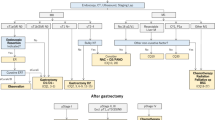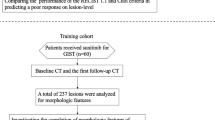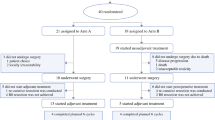Abstract
Background
Discontinuation of postoperative S-1 adjuvant monotherapy is a frequent problem in the management of patients with gastric cancer.
Methods
A total of 355 stage II/III gastric cancer patients who underwent gastrectomy and adjuvant S-1 were retrospectively analyzed using a multicenter dataset. We randomly assigned patients into either discovery or validation cohort in a 2:1 ratio. In the discovery cohort, 29 parameters were assessed as candidate factors to predict discontinuation of S-1 adjuvant within 6 months. A scoring system was designed using independent risk factors identified by the multivariate analysis. Reproducibility was tested in the validation cohort.
Results
Overall, 92 patients (25.9%) discontinued the treatment within 6 months because of adverse effects. Age, preoperative urea nitrogen (UN) and the preoperative albumin-to-bilirubin index (ALBI) showed the highest area under the curve (AUC) for the discontinuation of S-1 adjuvant within 6 months in each category: body status, blood tests and indices. In the multivariate analysis, age ≥ 64 years, preoperative UN ≥ 15.2 mg/dl and preoperative ALBI ≥ −0.265 were identified as independent risk factors. A scoring scale consisting of these three factors was developed for the prediction of drug discontinuation and demonstrated a greater AUC (0.728) than that of each of the three constituents. The time to treatment discontinuation decreased incrementally as the risk score increased. The reproducible findings were confirmed in the validation cohort.
Conclusions
We identified risk factors and developed a scoring scale to predict S-1 adjuvant monotherapy discontinuation in patients with stage II/III gastric cancer.




Similar content being viewed by others
References
Van Cutsem E, Sagaert X, Topal B et al (2016) Gastric cancer. Lancet 388:2654–2664
Kanda M, Kobayashi D, Tanaka C et al (2016) Adverse prognostic impact of perioperative allogeneic transfusion on patients with stage II/III gastric cancer. Gastric Cancer 19:255–263
Shen L, Shan YS, Hu HM et al (2013) Management of gastric cancer in Asia: resource-stratified guidelines. Lancet Oncol 14:e535–e547
Ychou M, Boige V, Pignon JP et al (2011) Perioperative chemotherapy compared with surgery alone for resectable gastroesophageal adenocarcinoma: an FNCLCC and FFCD multicenter phase III trial. J Clin Oncol 29:1715–1721
Ashraf N, Hoffe S, Kim R (2013) Adjuvant treatment for gastric cancer: chemotherapy versus radiation. Oncologist 18:1013–1021
Kanda M, Kodera Y, Sakamoto J (2015) Updated evidence on adjuvant treatments for gastric cancer. Expert Rev Gastroenterol Hepatol 9:1–12
Sakuramoto S, Sasako M, Yamaguchi T et al (2007) Adjuvant chemotherapy for gastric cancer with S-1, an oral fluoropyrimidine. N Engl J Med 357:1810–1820
Yoshikawa T, Terashima M, Mizusawa J et al (2017) A randomized phase III trial comparing 4 courses and 8 courses of S-1 adjuvant chemotherapy for p-stage II gastric cancer: JCOG1104 (OPAS-1). Ann Oncol 28:626
Tanaka H, Kanda M, Morita S et al (2017) Randomized phase II study of daily and alternate-day administration of S-1 for advanced gastric cancer (JFMC43-1003). Int J Clin Oncol 22:1052–1059
Kanda M, Shimizu D, Tanaka H et al (2018) Significance of SYT8 for the detection, prediction, and treatment of peritoneal metastasis from gastric cancer. Ann Surg 267:495–503
Schuhmacher C, Gretschel S, Lordick F et al (2010) Neoadjuvant chemotherapy compared with surgery alone for locally advanced cancer of the stomach and cardia: European Organisation for Research and Treatment of Cancer randomized trial 40954. J Clin Oncol 28:5210–5218
Aoyama T, Yoshikawa T, Shirai J et al (2013) Body weight loss after surgery is an independent risk factor for continuation of S-1 adjuvant chemotherapy for gastric cancer. Ann Surg Oncol 20:2000–2006
Aoyama T, Yoshikawa T, Hayashi T et al (2013) Risk factors for 6-month continuation of S-1 adjuvant chemotherapy for gastric cancer. Gastric Cancer 16:133–139
Ito Y, Kanda M, Ito S et al (2018) Intraoperative blood loss is associated with shortened postoperative survival of patients with stage II/III gastric cancer: analysis of a multi-institutional dataset. World J Surg 43:870–877
Liu JY, Peng CW, Yang XJ et al (2018) The prognosis role of AJCC/UICC 8(th) edition staging system in gastric cancer, a retrospective analysis. Am J Transl Res 10:292–303
Japanese Gastric Cancer Association (2014) Japanese gastric cancer treatment guidelines 2014 (ver. 4). Gastric Cancer 20:1–19
Kanda M, Mizuno A, Fujii T et al (2016) Tumor infiltrative pattern predicts sites of recurrence after curative gastrectomy for stages 2 and 3 gastric cancer. Ann Surg Oncol 23:1934–1940
Kanda M, Murotani K, Kobayashi D et al (2015) Postoperative adjuvant chemotherapy with S-1 alters recurrence patterns and prognostic factors among patients with stage II/III gastric cancer: a propensity score matching analysis. Surgery 158:1573–1580
Sasako M, Sakuramoto S, Katai H et al (2011) Five-year outcomes of a randomized phase III trial comparing adjuvant chemotherapy with S-1 versus surgery alone in stage II or III gastric cancer. J Clin Oncol 29:4387–4393
Kanda M, Tanaka C, Kobayashi D et al (2017) Proposal of the coagulation score as a predictor for short-term and long-term outcomes of patients with resectable gastric cancer. Ann Surg Oncol 24:502–509
Inaoka K, Kanda M, Uda H et al (2017) Clinical utility of the platelet-lymphocyte ratio as a predictor of postoperative complications after radical gastrectomy for clinical T2-4 gastric cancer. World J Gastroenterol 23:2519–2526
Tanaka Y, Kanda M, Tanaka C et al (2017) Usefulness of preoperative estimated glomerular filtration rate to predict complications after curative gastrectomy in patients with clinical T2-4 gastric cancer. Gastric Cancer 20:736–743
Kanda M, Tanaka C, Kobayashi D et al (2018) Preoperative albumin–bilirubin grade predicts recurrences after radical gastrectomy in patients with pT2-4 gastric cancer. World J Surg 42:773–781
Kanda M, Mizuno A, Tanaka C et al (2016) Nutritional predictors for postoperative short-term and long-term outcomes of patients with gastric cancer. Medicine (Baltimore) 95:e3781
Tsushima T, Hironaka S, Boku N et al (2010) Safety and efficacy of S-1 monotherapy in elderly patients with advanced gastric cancer. Gastric Cancer 13:245–250
Jeong JW, Kwon IG, Son YG et al (2016) Could adjuvant chemotherapy after surgery benefit elderly patients with advanced gastric cancer? J Gastric Cancer 16:260–265
Hikage M, Tokunaga M, Makuuchi R et al (2018) Surgical outcomes after gastrectomy in very elderly patients with gastric cancer. Surg Today 48:773–782
Tanahashi T, Yoshida K, Yamaguchi K et al (2018) Questionnaire survey on adjuvant chemotherapy for elderly patients after gastrectomy indicates their vulnelabilities. Gastric Cancer 22:130–137
Peters GJ, Noordhuis P, Van Kuilenburg AB et al (2003) Pharmacokinetics of S-1, an oral formulation of ftorafur, oxonic acid and 5-chloro-2,4-dihydroxypyridine (molar ratio 1:0.4:1) in patients with solid tumors. Cancer Chemother Pharmacol 52:1–12
Ikeda M, Furukawa H, Imamura H et al (2002) Pharmacokinetic study of S-1, a novel oral fluorouracil antitumor agent in animal model and in patients with impaired renal function. Cancer Chemother Pharmacol 50:25–32
Johnson PJ, Berhane S, Kagebayashi C et al (2015) Assessment of liver function in patients with hepatocellular carcinoma: a new evidence-based approach-the ALBI grade. J Clin Oncol 33:550–558
Yamanaka T, Matsumoto S, Teramukai S et al (2007) Analysis of risk factors for severe adverse effects of oral 5-fluorouracil S-1 in patients with advanced gastric cancer. Gastric Cancer 10:129–134
Tsujimoto H, Horiguchi H, Hiraki S et al (2012) Tolerability of adjuvant chemotherapy with S-1 after curative resection in patients with stage II/III gastric cancer. Oncol Lett 4:1135–1139
Yang J, Zhou Y, Min K et al (2014) S-1-based vs non-S-1-based chemotherapy in advanced gastric cancer: a meta-analysis. World J Gastroenterol 20:11886–11893
Author information
Authors and Affiliations
Corresponding author
Ethics declarations
Conflict of interest
The authors do not have any commercial interest or sources of financial or material support to report.
Human and animal rights
This study was conducted in accordance with the 1964 Helsinki Declaration and its later amendments or comparable ethical standards and with the ethical standards of the institutional committee
Additional information
Publisher's Note
Springer Nature remains neutral with regard to jurisdictional claims in published maps and institutional affiliations.
Electronic supplementary material
Below is the link to the electronic supplementary material.
Rights and permissions
About this article
Cite this article
Iizuka, A., Kanda, M., Ito, S. et al. Proposal of a Scoring Scale to Estimate Risk of the Discontinuation of S-1 Adjuvant Monotherapy in Patients with Stage II to III Gastric Cancer: A Multi-Institutional Dataset Analysis. World J Surg 43, 2016–2024 (2019). https://doi.org/10.1007/s00268-019-04942-y
Published:
Issue Date:
DOI: https://doi.org/10.1007/s00268-019-04942-y




